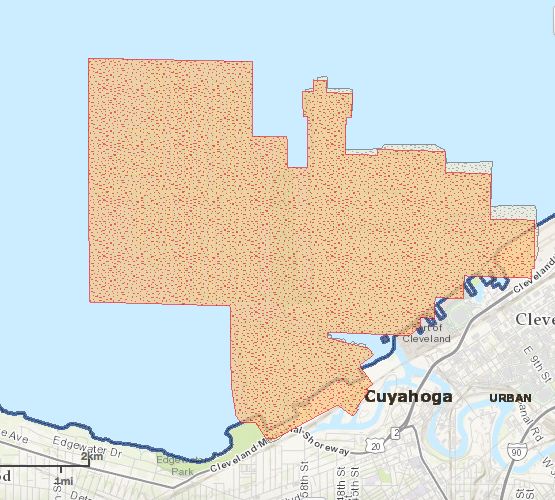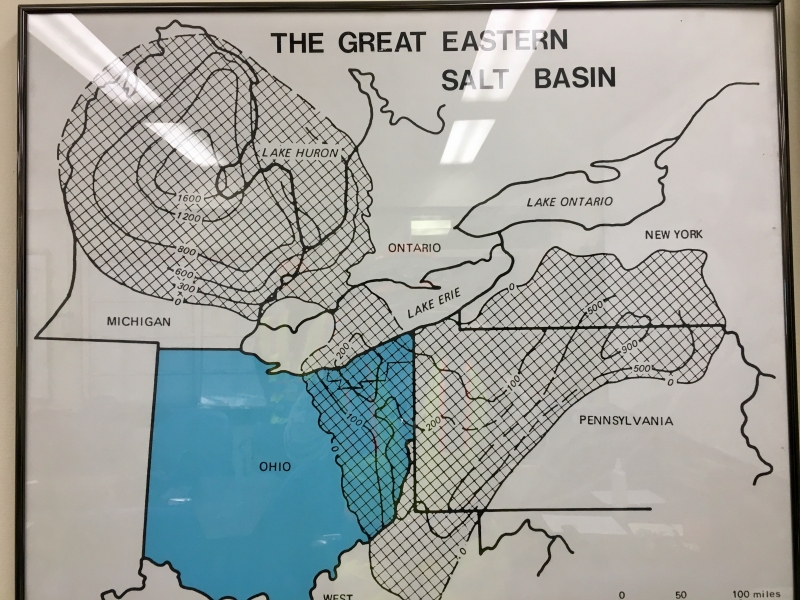
Posted on 12/26/2020 7:28:23 AM PST by texas booster
Down, down, down. In three minutes, the skip drops nearly 1,700 feet below Cleveland. Then the giant metal door swings open, and you’re deposited in an other-world, with walls, ceiling and floor made of salt.
Dirty brown salt at the Cargill mine’s entrance, where the rock has absorbed diesel fumes and dust for more than 60 years. Pristine white, with glimmering flecks, at the mine’s far reaches, 3 miles north, under Lake Erie.
“I look out at the water, and it’s like, man, we’re under that!” said Cargill employee Cachet Hilton, 45.
Every day, the 5-mile wide mine gets a little bigger, room by room, as crews stick explosives in the walls and blast the salt loose.
Crews jump in a truck to drive out to the far reaches of the mine each day, 20 minutes of bumping and jolting through a PacMan grid of pitch-black tunnels that also serve as a ventilation system.
The air feels dusty, a little gritty on your skin. You can taste the salt on your lips. And you kick it as you walk, like corn snow. Light is nonexistent, aside from the lamp on your hardhat and the headlights on vehicles.
The mine can produce 4 million tons of rock salt each year, but because of mild winters, the last two years the mine has produced about 75 percent of an average year. Last year, five Ohio counties produced about 4.5 million tons of salt. (Ohio is the fifth biggest producer of rock salt in the country.) The Cleveland mine produced the most.
How much longer will the mine exist?
Every year, engineers revise a 25-year plan, deciding where to drill next.
The mine could conceivably go on forever, expanding to the Canadian border, at least. But site manager Steve Horne says it has at least 50 years more, until global warming reduces the need for road salt or the process of trucking employees out to and salt back from the far reaches of the mine becomes too expensive.
How long has the mine been here?
Since about 1958, a year after the Morton salt mine in Grand River, under Lake Erie in Lake County. Cargill Deicing Technology bought the Cleveland mine in 1997.
Why is the mine under Lake Erie?
The mine could be anywhere in the Great Eastern Salt Basin, under a huge area stretching from Michigan to New York, through Ontario. Under Lake Erie, though, Cargill has to lease land from only one owner – the state of Ohio. Plus, Cargill can ship the salt all over the Great Lakes.
Does the mine leak?
Yes, in two spots: the skip (a cage elevator) and in one room where the ceiling converged and caused the mine to close temporarily four years ago. The water comes from the layers of rock in between Lake Erie and the mine, not from the lake itself, Horne said.
Cargill is still managing the leaks. Overall, the air in the mine is dry, though it may get humid in the summer.
“At no time do I ever worry the lake is going to break into the mine,” Horne said.
Is it cold?
Not really. The temperature is pretty steady year-round, about 68 degrees.
Does it smell?
Just a little stale and dusty, which sticks to your clothes and your hair. A single fan pushes fresh air through the mine and channels the dusty air, polluted with diesel fumes, back up to the surface. The fan is so strong that near the entrance, wind blows your hair around.
How far does the salt go from Cleveland?
From Cleveland, ships carry 1.6 million tons of salt to ports around the Great Lakes, including Duluth, Minnesota; Chicago; Milwaukee; and Canada. Salt is also transported by train as far as Massachusetts and by truck to southern Ohio. Governments buy it to spread on the road to melt snow and ice; businesses buy it for parking lots and other surfaces.
Cargill has two other rock salt mines, in New York and Louisiana.
Morton has a mine in Fairport Harbor, also under Lake Erie.
How many employees work at the mine?
About 220, with 160 of them below ground. Employees use a plastic, white and green tag system, to show who is underground at any time. They generally work 8-hour shifts around the clock, five days a week. On weekends, crews do maintenance.
How do they get the salt out?
Workers drill holes in the salt walls, then insert ammonium nitrate fuel oil. They blast the wall, then use a modified front-end loader called an LHD (short for load, haul, dump) to deposit the chunks of salt in a crusher-feeder-breaker machine, which channels it onto a conveyer belt. The belt leads to the mill, where the salt is refined, before being hoisted out on another skip. A giant machine claws at the ceiling and walls, to get all the excess salt.
About 30-50 percent of the total salt is extracted, with walls and columns of salt left to support the structure. There are no other supports, aside from metal studs drilled into some portions of the roof.
What if something goes wrong?
Cargill has a detailed safety plan, and visitors have to watch a 21-minute safety video before venturing underground. Everyone underground must wear what’s called a self rescuer in a metal container on a belt. The device fits over your mouth and changes carbon monoxide into carbon dioxide. In an emergency, miners would exchange their self-resuers for larger self-contained self-rescue devices, kept in boxes throughout the mine. Those provide oxygen for an hour.
There are green reflectors lining the tunnels, showing the way out. And the mine has two safe rooms stocked with food, water and oxygen to last three days.
Can you eat the salt?
Not really, even though it’s about 98-percent sodium chloride. The salt is good enough for animal feed. But for table salt, that happens at separate mines, where companies generally extract brine through a well or capture ocean water. Then they evaporate the water.
Can anyone tour the mine?
No, it’s closed to the public. But to feel what it’s like underground, check out John Pana’s video at RocktheLake.com.

When it collapses, Lake Erie and other Great Lakes will be severely impacted.

Looks like they can still dig for a while ...

Interesting story, thanks
Cargill? Isn’t that now another fine Chinese company?
Awesome read! Thanks for posting!
Lots of salt mined around south east Lake Huron.
Goderich Ontario
https://www.compassminerals.com/who-we-are/locations/goderich-ontario/
I live a few miles from the Morton Salt Plant at Grand Saline Salt Dome. They have mined down to 750’ and say they can continue for 20,000 years. And this is just one salt dome in Texas. There are hundreds from Texas to Mississippi.
Link please?
My home town of Cleveland. I learned about this at 12 or so from the Cleveland Press
Bookmark
Mining in Texas has a long and storied past.
I may do a post on this enormous salt mine. Local newspapers occasionally do stories on it, so I should be able to get material.
Completely under control.
After all, what's the worst that can happen?
The history of salt. it was not always a commoditiy.
I remember when the Press used to give free baseball tickets if you got straight As in school! There would be 3000 people in that 80,000 seat Municipal Stadium.
There’s a defunct mine underneath Detroit. I’ve read that most of the equipment down there is from the 1940’s. Pristine vehicles that are completely encrusted in salt. They had to be disassembled up top and transported in pieces down an elevator to be reassembled in the mine.
If they ever came into the atmosphere, they would rust almost immediately.
Disclaimer: Opinions posted on Free Republic are those of the individual posters and do not necessarily represent the opinion of Free Republic or its management. All materials posted herein are protected by copyright law and the exemption for fair use of copyrighted works.